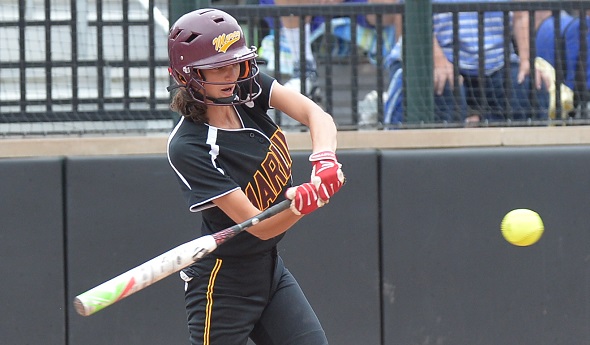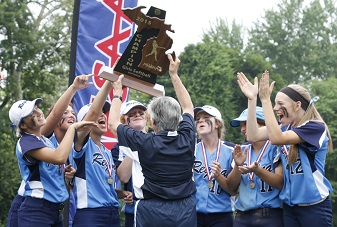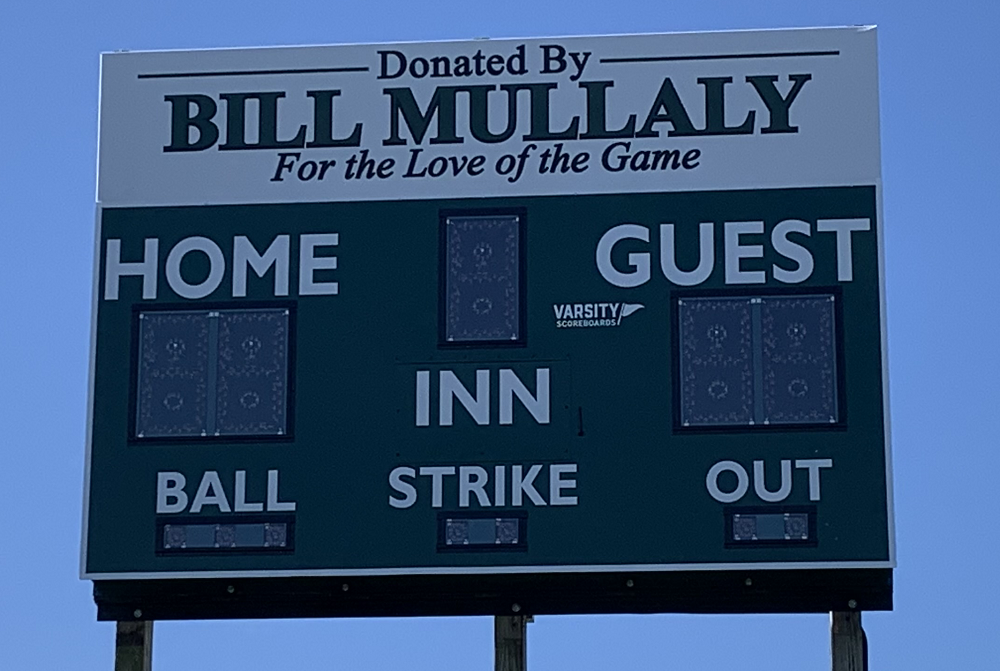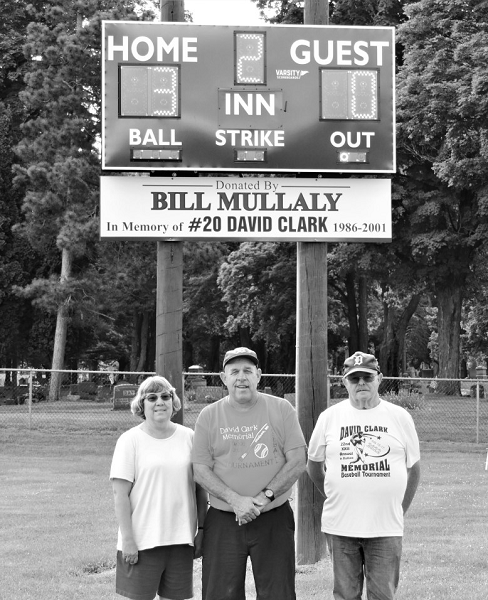
Detroit Powers Succeed Amid Lower Numbers
By
Tom Markowski
Special for Second Half
April 20, 2016
Participation in spring sports, following a similar decline in student-aged population in Michigan, has been on a decline statewide over the last decade.
 But while some like baseball have experienced a slight bounce-back over the last few seasons, softball in particular has seen its numbers continue to fall.
But while some like baseball have experienced a slight bounce-back over the last few seasons, softball in particular has seen its numbers continue to fall.
Coaches and administrators in the Detroit area point to a number of factors intertwined that produced a snowball-like effect – and now it seems to have come to a head.
Three softball programs in the Catholic League Central, a division that competes at a high level statewide, don’t have sufficient numbers to field a junior varsity this spring. Many programs don’t sponsor freshmen teams for the same reason.
But for schools like Birmingham Marian, Farmington Hills Mercy and Livonia Ladywood not to have a junior varsity softball team is quite shocking to some – especially considering that Mercy enters this season ranked No. 3 in Division 1 and Ladywood is No. 2 in Division 2.
Specialization fallout
Marian athletic director Dave Feldman isn’t among those stunned. He saw this coming. Feldman points to the 2007-08 school year when the Michigan High School Athletic Association was forced, by court decision, to switch the volleyball season from the winter to the fall and the girls basketball season from the fall to the winter.
Feldman has a daughter, a freshman at Marian, who participated on the junior varsity volleyball team this fall. When that season was over she joined a club volleyball team. Feldman said the club volleyball season begins in December and continues on into June.
“It’s not AAU,” Feldman said. “But you need to be an AAU member (to play). They play all of the time. Heck, they played on Easter Sunday. And every club is filled.”
The pressure on athletes to play year-round is arguably greater now than it ever has been, and can come from coaches, peers and family – based on a frequent misconception that if athletes want to earn a scholarship, they better keep up with the Joneses or be left behind.
Feldman said he’ll back his daughter with whatever decision she makes. If she wants to play volleyball nine or 10 months a year, he’ll support that. But Feldman said, financially, it’s getting out of hand. He estimated between the cost of airfare, hotels and meals that he’ll spend $6,500 in support of his daughter playing club volleyball.
And, according to Feldman, the increase in attention on volleyball is affecting participation in other sports.
“(Girls) basketball is fighting for its life,” he said. “Our field hockey program (a fall sport) is fine. Our lacrosse teams are fine.
“We have 15 playing volleyball at all three levels. We had 16 (total) try out for softball and we made two cuts. We haven’t had a JV the last two years. The last time we had a freshman (softball) team was in 2004 or 2005. The last few years the numbers have dropped off. It’s the specialization.”
Simply signs of change?
Warren Regina is another member of the Catholic League Central. Regina athletic director Diane Laffey also is the head coach for softball and basketball, and she said she thinks lacrosse has drawn some athletes away from softball – which makes sense, although the total number of girls playing high school lacrosse in Michigan has increased only about 1,000 over the last decade, while softball participation is down 4,000 athletes over the same time.
One should not use Regina as an example of decline – Laffey’s team won the Division 1 championship last spring and fields a softball team at all three levels. At the same time, Regina also has seen a rise in participation in lacrosse. There are 18 playing for both the varsity and junior varsity this spring, the highest participation in school history.
Mercy varsity softball coach Alec Lesko said, simply, that times have changed. Mercy reached the Division 1 Semifinals last season, just as Ladywood did in Division 2 the year before – yet despite this success, Mercy’s number of softball players also has declined.
 “(The students) have many more options,” Lesko said. “In addition to their school work there’s band, theatre, honors society clubs. In the past kids would play three sports and be in the band. All of my daughters were multi-sport athletes. By their sophomore year they had to make a decision (on which sport they would concentrate).
“(The students) have many more options,” Lesko said. “In addition to their school work there’s band, theatre, honors society clubs. In the past kids would play three sports and be in the band. All of my daughters were multi-sport athletes. By their sophomore year they had to make a decision (on which sport they would concentrate).
“It’s also economics. They want to earn a scholarship. You hear horror stories about (the cost of) student loans. Even the big schools have trouble getting the (students to play softball).
“As far as college, and I can only speak about softball, the Big Ten coaches want the player they recruit to play other sports,” Lesko added. “I hope to have a JV program next year. A player that misses 30 JV games, we will feel that crunch later. There are those who think JV softball is a waste of time, that you should just compete in travel (during the summer). We will get some of those kids. Those who compete in travel then come to us as sophomores.”
Reasons for optimism
Don Peters is the softball coach at Clarkston, and between coaching travel and at the high school level he’s put in 35 years. He coached travel before taking over the Clarkston program. Peters said the two complement each another, or at least they should.
“I know some disagree,” he said. “The girls have a lot of choices in the spring. Look at all of the sports they can play. I don’t think lacrosse has cut into the numbers. Not yet, but it’s probably going to. We haven’t been affected. We have 45 (covering three teams) in our program. We really push softball in our community because it’s been established.”
Peters said coaches in softball and baseball need to make the game enjoyable, and one way is to reward those who chose to participate by playing them on a regular basis. A student who is No. 14 or 15 on a squad often will play once a week and, with all of the options available, isn’t willing to put in the practice time for limited game action.
Mercy senior first baseman Abby Krzywiecki played a variety of sports before her freshman year. It was then she decided that softball would be her main sport and she chose to pour all of her energy into it.
She said it’s not all gloom and doom for her sport.
“We had a small freshmen class (last year),” she said. “When I came in we had a large class. It was one of the biggest. It’s not that we’re not getting softball players. In the travel world, it’s becoming more intense. We have more younger people playing. The sport is getting more intense. The talent level is getting higher.”
 Tom Markowski is a columnist and directs website coverage for the State Champs! Sports Network. He previously covered primarily high school sports for the The Detroit News from 1984-2014, focusing on the Detroit area and contributing to statewide coverage of football and basketball. Contact him at [email protected] with story ideas for Oakland, Macomb and Wayne counties.
Tom Markowski is a columnist and directs website coverage for the State Champs! Sports Network. He previously covered primarily high school sports for the The Detroit News from 1984-2014, focusing on the Detroit area and contributing to statewide coverage of football and basketball. Contact him at [email protected] with story ideas for Oakland, Macomb and Wayne counties.
PHOTOS: (Top) A Farmington Hills Mercy hitters prepares to connect during last season's Division 1 Semifinal against Caledonia. (Middle) Warren Regina coach Diane Laffey hoists her team's championship trophy after the Saddlelites downed Caledonia in the Final last spring.

Mullaly's Devotion to Local Sports Burns Brightly with Scoreboard Donations
By
Doug Donnelly
Special for MHSAA.com
April 11, 2023
HILLSDALE – Sports have always been a big part of Bill Mullaly’s life.
 In high school, he played on the 1975 Hudson football team that set a national record with a 72-game winning streak.
In high school, he played on the 1975 Hudson football team that set a national record with a 72-game winning streak.
He coached an Arizona high school team to back-to-back state softball championships in the 1990s.
And the 63-year-old Hillsdale resident has spent nearly three decades as an MHSAA-registered official in basketball, volleyball, baseball, and softball.
Now, he’s giving back to multiple communities and school districts in southeast Michigan by purchasing and donating scoreboards for use at recreation and high school fields.
"Bill is a great example of everything that is right with sports,” said Pittsford athletic director Mike Burger. “He has so much enthusiasm and love for the game. I have known him a long time and can honestly say he is one of the good ones that I have had the good fortune of meeting along my journey.”
Mullaly decided to start his scoreboard campaign a couple of years ago and, so far, has donated a total of 15 scoreboards to seven communities in south-central Michigan, including four in his hometown of Hudson.
“It’s to make the games more fun and more enjoyable,” he said. “I’ve been to two places this spring where they have scoreboards, but they aren’t working. It’s frustrating. It improves the whole game. It’s for everybody, the coaches, the players, the fans. It helps everybody.
“I’ve got a lot of positive feedback. People are grateful.”
Mullaly said he is fortunate to be in a position to help out the communities. His donations have all been to either recreation fields or high schools to which he has a connection, whether it be where he’s from ( Hudson), where he is a substitute teacher (Litchfield) or where he hosts baseball youth tournaments (Concord).
One of the scoreboards in Pittsford is in memory of his mother, Beverly, a 1948 Pittsford graduate.
“Someone said to me a couple of years ago, ‘What’s your legacy going to be?’” Mullally said. “I started thinking about what I can do to make a difference.
“I saw a lot of recreation fields that do not have scoreboards. Most of them don’t. A lot of schools don’t have a scoreboard, in fact. I looked into the price and what it would take to get them and came up with this thing that I’m going to donate scoreboards to parks. I saw a couple of schools that needed them.”
 Mullaly purchases the scoreboards, then leaves it up to the school district or community to install them, which sometimes has been a hangup. In Hudson, he enlisted the help of a friend, Bruce Isenhower, and his son, Ryan, a former Hudson quarterback who now owns a construction company. They’ve put up all four scoreboards Mullaly has donated to Hudson.
Mullaly purchases the scoreboards, then leaves it up to the school district or community to install them, which sometimes has been a hangup. In Hudson, he enlisted the help of a friend, Bruce Isenhower, and his son, Ryan, a former Hudson quarterback who now owns a construction company. They’ve put up all four scoreboards Mullaly has donated to Hudson.
“It’s more than just buying it, it’s getting it put up,” Mullaly said. “They have installed them, completed the wiring and it’s great. It’s great to have a working scoreboard there. I’m just trying to give back and make a positive difference.”
His first donation was to Concord, which went to the town’s recreation organization.
“They have five fields and three scoreboards,” he said. “It just adds to the game, the experience. Everyone wants to know the score at these games.”
In Hudson, two went to Memorial Park and two to Will Carleton Park, which is home to Hudson’s middle school and junior varsity softball teams.
Last winter his donation went to North Adams-Jerome for a varsity softball field.
“I’ve been there before,” he said. “The thing barely worked, and you couldn’t see the numbers. I wanted to help them out.”
Pittsford has installed one of two scoreboards Mullaly has purchased for the district for its baseball and softball fields. Quincy and Litchfield are using scoreboards donated by Mullaly. He has also donated a scoreboard to Union City.
“A guy was building a new complex two years ago. I said, ‘If you build it, I’ll donate the scoreboard.’ He said, ‘You will?’ I thought it was great what he was doing, and I wanted to be part of it,” Mullaly said.
Most of the signs include the moniker, “Donated by Bill Mullaly – For the Love of the Game,” which is something he and a friend thought up.
“My main focus was to do it for parks that the rec teams play on,” Mullaly said. “They don’t have a booster club or a budget. That’s how it began, but then I started going around to high schools and noticing they need scoreboards too.
“I get some satisfaction looking out there,” he said. “I feel blessed that I am able to do it. It’s neat when you are umpiring a game and you look out there.”
The first scoreboard Mullaly purchased in 2021 cost less than $3,000. They are now running a little more than $4,000 each.
“It’s useful and practical and can last for years if they take care of them,” Mullaly said.
After college, Mullaly lived for 15 years in Lake Havasu City, Ariz., where he taught and coached softball. He makes a return visit annually to that area and manages to get on the high school softball umpiring schedule while in town.
He retired as a teacher at Homer Community Schools in 2010. In addition to being a substitute teacher at Litchfield, umpiring and working as an official in other sports, he writes about sports for the Hudson Post-Gazette and Homer Index, two weekly newspapers. He’s done that since 1996. He also is a historian for the Hudson football team and area athletics.
He’s never far from some aspect of sports.
“I’m just trying to give back to the communities, to the sport,” Mullaly said. “I wanted to do something positive.”
 Doug Donnelly has served as a sports and news reporter and city editor over 25 years, writing for the Daily Chief-Union in Upper Sandusky, Ohio from 1992-1995, the Monroe Evening News from 1995-2012 and the Adrian Daily Telegram since 2013. He's also written a book on high school basketball in Monroe County and compiles record books for various schools in southeast Michigan. E-mail him at [email protected] with story ideas for Jackson, Washtenaw, Hillsdale, Lenawee and Monroe counties.
Doug Donnelly has served as a sports and news reporter and city editor over 25 years, writing for the Daily Chief-Union in Upper Sandusky, Ohio from 1992-1995, the Monroe Evening News from 1995-2012 and the Adrian Daily Telegram since 2013. He's also written a book on high school basketball in Monroe County and compiles record books for various schools in southeast Michigan. E-mail him at [email protected] with story ideas for Jackson, Washtenaw, Hillsdale, Lenawee and Monroe counties.
PHOTOS (Top) A scoreboard donated by Bill Mullaly stands tall at Pittsford High School. (Middle) Mullaly, middle, stands last July with Jo Ann and Watson Clark in front of a scoreboard he donated to Will Carleton Park; the photo was taken during the 22nd David Clark Memorial Baseball Tournament. (Top photo courtesy of Pittsford High School; middle photo courtesy of Bill Mullaly.)

